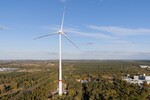News Release from WWF Germany
Wind Industry Profile of
As Renewables Replace Coal, Planned Gas Plants Destined to Become Expensive White Elephants
Renewables, storage and more flexible technology will provide enough electricity and keep the UK’s electricity grid stable as coal is phased-out over the next few years – eliminating the need to build new carbon-emitting large gas plants, a new report by WWF and Sandbag has found. The report concludes that, even by conservative estimates, planned large scale gas projects aren’t needed; renewable generation will surpass coal’s contribution to the energy mix by 2022, ensuring the UK doesn’t need to replace one dirty fossil fuel with another.
The report, Coal to Clean – The end of the gas era is near, outlines the energy mix up until 2025. The National Grid confirmed in April that the UK broke a new record and went without coal generation for 76 hours for the first time since the 1880s, a trend that is set to continue with renewable generation on track to surpass coal’s contribution to the energy mix by 2022.
Gas generation has dropped as well, after peaking in 2008. In 2017, gas generation was already 24% lower than that peak. If all current gas development in planning was to go ahead it could lock the UK into emissions for the next 40 years at levels way above what the UK can afford if it is to tackle climate change and deliver on its international commitments under the Paris agreement. At best it leaves us with expensive, white elephant infrastructure overtaken by renewables.
Gareth Redmond King, WWF Head of Climate and Energy said: “The UK government is leading the way and has set an international precedent by sending coal to the dustbin of history. However it is essential the Government does not substitute one dirty power source for another. We need to continue to look forward, doubling down on investment in renewables and targeting our efforts on long term energy storage. We should focus next on removing gas from the energy mix altogether.”
The UK has half of the planned gas power stations in Europe, according to Platt’s Power Station Tracker. The analysis by WWF and Sandbag shows that these gas projects don’t need to go ahead to keep the lights on – and will cost energy bill payers more if they do. The results also show that only approximately 5GW of gas capacity will be required to provide a basic, underpinning level of power in 2025 to support intermittency in renewables. The UK already has almost 10GW of highly efficient combined cycle gas turbine (CCGT) power stations built in this decade; these are likely to remain operational well into the 2030s.
By 2020 renewables are forecast to be the single largest source of electricity generation in the UK.The UK Government needs to take advantage of the boom of renewables – unleashing the potential of solar and wind, supporting investment in renewable technology, and innovation in long term electricity storage. This would allow the UK to reduce its carbon emission in line with pledges made in the Paris Climate Agreement.
To reach our international climate commitments, we need to lower the total hours gas plants are allowed to run each year. The only foreseeable space for gas in the UK’s energy mix will be on a small scale, to fill in gaps when other sources of supply are unavailable.
Charles Moore, Analyst at Sandbag, said: “Amazingly, the UK’s coal phase-out will not require a ‘gas bridge’ as many predicted: surging renewable energy ensures that gas use in the power sector has already peaked. The UK does not need to build any more large gas power plants to keep the lights on. Measures to support the construction of a new wave of large gas plants would prove a costly mistake for energy bill-payers and the climate. Ultimately, meeting our climate objectives will require a total gas phase-out: the Government must begin planning for this now.”
Government policy in this parliament will be key to capitalizing on renewable opportunities while avoiding the expense of any new large gas plants, setting the UK on a trajectory towards a gas phase-out. The report includes five key recommendations for Government as we navigate through a coal to clean transition. The recommendations include:
- Unleashing the potential of solar and onshore wind now
- Not bringing forward policy measures to support new build large gas
- Preventing excess emissions from small peaking gas
- Increasing innovation funding for long term electricity storage technologies
- Mitigating the risk of a slower fall in gas use and begin planning now for a gas phase-out
- Source:
- WWF UK
- Author:
- Press Office
- Link:
- www.wwf.org.uk/...
- Keywords:
- WWF, UK, gas plant, coal, renewable energy, report, storage, Sandbag






















